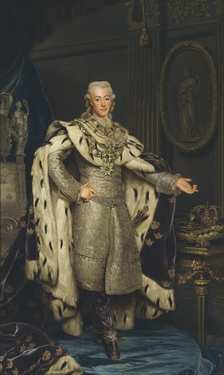Social:List of enlightened despots
An enlightened despot (also called benevolent despot) is an authoritarian leader who exercises their political power according to the principles of the Enlightenment.[1]
Historically they were monarchs using enlightened ideas and principles in order to enhance the central government's power (thereby their own power). Some of them followed the philosophers but they did only what they thought their people wanted. The people themselves had little choice in the matter. [2] Most were directly linked to the Enlightenment period in the 18th and early 19th centuries.
Characteristics
Enlightened despots were monarchs who distinguished themselves from despots (in the ordinary sense) by the way they governed; they claimed to rule for the well-being of their subjects. For example, an enlightened despot may focus government priorities on matters of public importance such as healthcare, education, nonviolent population control, or physical infrastructure. He or she may be committed to peaceful relations and may even allow for some democratic decision-making to exist, such as public referendums, but did not propose reforms that would undermine their sovereignty or disrupt social order. As John Stuart Mill articulated: "Despotism is a legitimate mode of government in dealing with barbarians, provided the end be their improvement."[3]
Although their reigns were based upon Enlightenment principles, their beliefs about royal power were similar to those of regular despots. Enlightened despots believed that they were destined to be ruler the moment they were born.
Enlightened rulers may have played a part in the abolition of serfdom in Europe.[4]
Emperor Joseph II once said: "Everything for the people, nothing by the people".[5]
List
- Napoleon Bonaparte
- Peter the Great of Russia
- Catherine the Great of Russia[6]
- Charles III of Spain[7]
- Frederick the Great of Prussia[8]
- Frederick VI of Denmark[9]
- Gustav III of Sweden[9]
- Joseph II, Holy Roman Emperor[7]
- Joseph I of Portugal (through his minister, the Marquis of Pombal)
- Maria Theresa of Austria
- Leopold I, Grand Duke of Tuscany[7]
- Maria Carolina of Austria, Queen of Naples[10]
- Christian VII of Denmark (through his minister Johann Friedrich Struensee)
- Charles Frederick, Grand Duke of Baden
- Philip, Duke of Parma (through his minister Guillaume du Tillot)
- Francesco III d'Este, Duke of Modena
- Ercole III d'Este, Duke of Modena
- Charles Emmanuel III of Sardinia
- Victor Amadeus III of Sardinia
- Akbar
- Krishna Raja Wadiyar IV
- Selim III of the Ottoman Empire[11]
- Michael Obrenović III of Serbia[12]
- Alenxandru Ioan Cuza of Romania
- Images of enlightened absolutist monarchs
Enlightened despots in recent history
Like many political classifications, the title of enlightened despot suffers from its inherent subjectivity. In recent history dictators such as Porfirio Diaz, Lee Kuan Yew, Josip Broz Tito, António Salazar, Isaias Afwerki, Park Chung-hee, Chiang Kai-shek, Pervez Musharraf, Thomas Sankara, Mohammad Reza Pahlavi, and Muammar Gaddafi have been characterized as enlightened despots. In all of these cases the point of view as to just how "enlightened" or "dictatorial" they are is largely subjective.
Generally, dictators who serve in office for a very long period are more likely to be regarded as enlightened because they will often be forced to pay some attention to the public interest in order to remain in power and, more importantly, to be regarded as legitimate. Dictators who hold office for a brief period of time or are simply members of a rotating dictatorial elite (such as those heading some juntas) may have less charismatic authority and prove to be forgettable and are therefore often easier to demonize.
See also
- Enlightened absolutism
- Authoritarianism
- Noblesse oblige
Notes
- ↑ http://www.britannica.com/topic/enlightened-despotism
- ↑ Perry, Chase & Jacob 2015, p. 442.
- ↑ Mill 1989, p. 13.
- ↑ "Disappearance of Serfdom. France. England. Italy. Germany. Spain.". http://www.1902encyclopedia.com/S/SLA/slavery-12.html.
- ↑ World of the Habsburgs. "Joseph II: The long-awaited son". Textmode. World of the Habsburgs. http://www.habsburger.net/en/chapter/joseph-ii-long-awaited-son. "‘Everything for the people, nothing by the people’"
- ↑ McKay, "A History of Western Society", Houghton Mifflin Company, 2006, p.616-619
- Catherine the Great: Portrait of a Woman R K. Massie, "Catherine the Great: Portrait of a Woman", Random House, 2012
- ↑ 7.0 7.1 7.2 H.M. Scott, 1990, p. 1.
- ↑ H.M. Scott, 1990, p. 265ff
- ↑ 9.0 9.1 H. Arnold Barton, Scandinavia in the Revolutionary Era 1760-1815, University of Minnesota Press, 1986, p.142ff. ISBN:0-8166-1392-3.
- ↑ Bearne, Catherine Mary (1907). A Sister of Marie Antoinette: The Life-Story of Maria Carolina, Queen of Naples. T. Fisher Unwin: London, p 142.
- ↑ Ustun, Kadir (2013). The New Order and Its Enemies: Opposition to Military Reform in the Ottoman Empire, 1789 - 1807. Columbia University. doi:10.7916/D80Z79P1.
- ↑ Cox, John K. (2002). The History of Serbia. Westport, Connecticut: Greenwood Press. p. 44. ISBN 9780313312908. https://books.google.com/books?id=U765FGDfbPoC.
References
- Biography.com Editors. "Joseph II Biography". A&E Television Networks. http://www.biography.com/people/joseph-ii-9358214.
- Mill, John Stuart (25 August 1989). J. S. Mill: 'On Liberty' and Other Writings. Cambridge University Press. ISBN 978-0-521-37917-5. https://books.google.com/books?id=PlZll-SI1FQC.
- Perry, Marvin; Chase, Myrna; Jacob, James; Jacob, Margaret; Daly, Jonathan (1 January 2015). Western Civilization: Ideas, Politics, and Society, Volume I: To 1789. Cengage Learning. ISBN 978-1-305-44548-2. https://books.google.com/books?id=tC5BBAAAQBAJ. Retrieved 20 September 2015.
- World of the Habsburgs. "Joseph II: The long-awaited son". Textmode. World of the Habsburgs. http://www.habsburger.net/en/chapter/joseph-ii-long-awaited-son. "‘Everything for the people, nothing by the people’"
- Scott, H. M., ed., Enlightened Absolutism: Reform and Reformers in Later Eighteenth-Century Europe, (University of Michigan Press, 1990)








